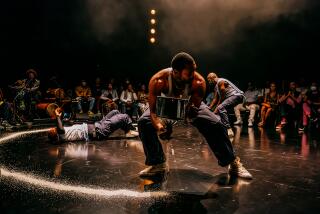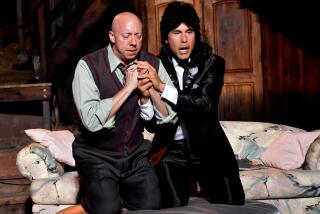STAGE REVIEW : DOWN-HOME ‘TARTUFFE’ PLAYS AT THE OLD GLOBE
SAN DIEGO — We’re in Kentucky, 1870, at the home of that upstandin’ citizen, Organ Pernell-- Organ ? Welcome to “Tartuffe” at the Old Globe, y’all.
That change of spelling (from the French Orgon to the substitute Organ) is one of many transformations undergone by this “Tartuffe.”
The playground that director Craig Noel has chosen for Moliere’s phony preacher man, Tartuffe, is a lush antebellum setting--a grand, airy house with porches, handsomely designed by Richard Seger and sunlit by Kent Dorsey.
Tartuffe has so thoroughly hoodwinked the gullible Organ into believing in the soundness of his religiosity that it throws the Pernell family into uproar and confusion.
Not only has the sinister minister moved himself into the mansion (with his now Indian sidekick), but all kinds of other hell are breaking loose. Mary Anne’s wedding to her beloved Valery is off because Papa Organ wants her to marry the holy man; Organ’s son is disinherited for finding fault with the preacher; Organ deeds all of his wealth to Tartuffe and only when his wife, Elmira, offers to restage a clumsy attempt at seduction by Tartuffe, does her foolish husband finally recognize that he’s been duped.
This pixilated departure from Moliere might have been deliciously outrageous. The re-fashioning of the play by translators/adapters Robert Strane and Eberle Thomas to fit a different place and time bodes well at first, but ends up straining credibility--nowhere more so than in the much rewritten finale.
It careens so giddily toward happy resolution that it turns into broad farce as if caught up in its own midsummer madness. The Strane/Thomas writing and director Noel’s inventiveness run out of gas before the end, just when they should peak, settling instead for easy pratfalls and climaxing with the appearance of President Ulysses S. Grant.
In contrast, one recalls the mounting hilarity of the Globe’s production of “The Country Wife” five summers ago. It never faltered stylistically and its apotheosis was an epilogue, written by director Jack O’Brien, that flawlessly straddled the present and the past, daring to end on a bawdy note totally in keeping with the play.
One misses this kind of stylistic follow-through in “Tartuffe.”
Moliere is not especially well-served by the Southern American context or the production’s decline into slapstick. This is one of the playwright’s darker satires, matched only by his fury at the medical and legal professions. Reducing it to laugh-a-minute entertainment alters its texture, giving us a quite different play.
What rescues this “Tartuffe” from dismissal as puff pastry, is Jonathan McMurtry’s reptilian performance in the title role--a sallow, flaccid, slug of a man in dusty blacks, redolent with deviousness and hypocrisy.
McMurtry has long been a Globe favorite for endowing portraiture with meticulous detail, from such cameo appearances as the clothespin acupuncturist in “Comedy of Errors,” to his slow-laughing sportscaster in “Yankee Wives” and his deadpan, deadly Iago in “Othello.” He has the rare ability to inform character psychologically and his Tartuffe--a paragon of moral and physical flab--lives up to expectation: mouth transfixed in a permanent sneer, eyes perpetually at half-mast, stealing shifty upward glances at that menacing foreign territory, heaven.
More of this sort of incisiveness would have been welcome and might have lifted the concept and the play into a more rewarding realm, but none was forthcoming.
Other performances, including that of Margo Martindale’s brassy maid Doreen (a pivotal cog in this comedy) and Mitchell Edmonds’ quasi-Vaudevillian Organ, remain superficial, playing for laughs without letting motivation adequately propel them.
Kandis Chappell is refreshingly direct as the much-put-upon Elmira as is John Walcutt’s clean-cut Valery, but too many of the others settle for a flashing of surfaces, with the mounting frenzy and broadness ultimately seeming overwrought.
Not so with Lewis Brown’s elegant costumes and Larry Delinger’s playful, tongue-in-cheek music.
More to Read
The biggest entertainment stories
Get our big stories about Hollywood, film, television, music, arts, culture and more right in your inbox as soon as they publish.
You may occasionally receive promotional content from the Los Angeles Times.










